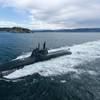In a bipartisan vote, the U.S. House Transportation and Infrastructure Committee amended the Homeland Security Agency proposal to protect the Coast Guard and Federal Emergency Management Agency from being absorbed into the proposed new agency.
The bipartisan amendment to the Homeland Security Act of 2002 (H.R. 5005) was approved by a voice vote. The amendment was authored by:
- U.S. Rep. Don Young (R-Alaska), Chairman of the Transportation Committee
- U.S. Rep. James Oberstar (D-MN), Ranking Democrat of the Transportation Committee
“The Bill Raises Many Concerns That Congress Must Address”
“There is no doubt that after the events of September 11, the President must be given the resources to protect this country from all attacks, whether terrorist or otherwise,” Young said during the markup. “I want to make it clear that I do not object to the creation of a Department of Homeland Security. However, the bill as introduced raises many concerns which this Congress has a responsibility to address.
“When this bill is signed into law by the President, I hope that we can all be proud of the product that we create.
“I hope that we can all be sure that the Department of Homeland Security can indeed keep our country secure from terrorist attacks, while preserving all the important missions that these many agencies carry out each day.”
Transportation Committee Amendment Protects Missions Of Coast Guard & FEMA
“The legislation states that the primary mission of this department is to prevent and respond to terrorist attacks,” Young told the Committee. “It is very likely that all other important missions of the Coast Guard and FEMA will become secondary to the effort to combat terrorism.
“It seems appropriate to transfer the new Transportation Security Administration and the Federal Protective Services to the Department of Homeland Security because both of those agencies have as their primary mission securing against acts of terrorism or violence. They are both security agencies.
“However, the Coast Guard provides a long list of services to average citizens and has had limited responsibility in the area of security. Maritime security is an extremely important function of the Coast Guard which should not be minimized.
“Other functions are also extremely important. The Coast Guard provides for search and rescue of boaters, they keep our waterways open to navigation through their ice breaking efforts and maintaining aids to navigation, they protect our environment and fisheries resources, they keep passengers safe on commercial vessels of all types, and interdict both drugs and illegal immigrants.
“We’ve given the Coast Guard a great deal of work to do and they have always carried out their duties with distinction. If the Secretary of Homeland Security wants to commit his entire effort to preventing terrorist attacks, under this bill he can reduce the resources of the Coast Guard for these other missions and direct those resources entirely to security.
“I have the same concerns regarding FEMA. FEMA is doing a great job responding to both natural and man-made disasters throughout the country. FEMA has many other responsibilities as well.
“They are important not only in responding to disasters but in preventing and preparing for disasters of all types. They play a key role in training fire fighters. They prepare flood plain maps and operate the flood insurance program.
“If FEMA becomes part of the Department of Homeland Security what will happen to these other important functions?
“Will Homeland Security continue to provide disaster relief for hurricanes in the Gulf of Mexico, fire fighting assistance out west, or respond to earthquakes in California?
“Will they have time to provide accurate flood maps and work with homeowners to mitigate against future flood losses?”
Transportation Committee Amendments To H.R. 5005
Transfer Of Transportation Security Administration
The amendment retains the transfer of The Transportation Security Administration (TSA). The amendment ensures that the transfer of TSA to a new Department does not disrupt the effort to get the TSA operating properly during this transitional period.
The amendment requires that the Transportation security functions which are being transferred remain a distinct unit under the Under Secretary of Border and Transportation Security.
An Assistant Secretary for Transportation Security would head this separate unit.
The Amendment requires that the transfer of the TSA functions would not occur until the top level management of the department and TSA are in place, until TSA gets explosive detection systems deployed at all airports where they are required, and the Secretary certifies that a sufficient number of airport security and law enforcement officers have been deployed at all airports where screening is required.
Coast Guard To Remain In Department Of Transportation
The amendment keeps the U.S. Coast Guard in the Department of Transportation, creates a new Coast Guard Undersecretary whose duties include Homeland Security, and ensures that Coast Guard core missions are performed at adequate levels as envisioned by Congress.
The amendment requires the Coast Guard to continue to devote an adequate amount of resources to core Coast Guard missions of search and rescue, fisheries law enforcement, drug interdiction, migrant interdiction, marine environmental protection, and marine safety.
This will ensure that the Coast Guard has the flexibility to address all homeland security and port security threats, and also perform other important maritime missions.
FEMA To Remain An Independent Agency
The amendment keeps FEMA independent from the Department of Homeland Security but specifies more carefully the missions of FEMA as enacted by Congress.
FEMA would keep the preparedness and response functions presently handled by FEMA, unrelated to homeland security.
This includes directing the Federal response and providing assistance for recovery from a natural disaster, the Urban Search and Rescue Program, and the U.S. Fire Administration, which has provided basic firefighting training and assistance.
Responsibility for coordinating preparedness and response to terrorist attacks would be assigned to the Department of Homeland Security (DHS), and FEMA would retain its traditional role as the lead agency in responding to disasters caused by natural hazards, such as floods, hurricanes, and tornados.
FEMA and DHS will enter into a cooperative agreement to clarify the duties of each agency.
Federal Protective Service To Transfer To Department Of Homeland Security
The amendment transfers the Federal Protective Service to Homeland Security but also contains much of H.R. 4770 approved by the Committee on May 22, 2002.
The Federal Protective Service was set up to protect federal facilities.
The amendment will enhance the authority, responsibility, pay, and benefits of Federal Protective Service officers by granting them Law Enforcement Officer status and give the Secretary special pay authority.
The amendment will not impact the current functions and authority of the Administrator of GSA with regard to the protection of federal buildings or limit the Administrator’s authority to collect fees for protective services.
Prohibition Of Use Of Highway Trust Funds
The amendment would prohibit the Highway Trust Fund and other transportation trust funds from being transferred to or otherwise made available to the new Department of Homeland Security for security purposes.
H.R. 5005 provides broad authority to transfer the funds of each agency that is transferred to Homeland Security along with the agency being transferred.
This broad authority could be used to transfer funds derived from the transportation trust funds to the Department of Homeland Security without going through Congress or this Committee.
Acquisition Of Property
The amendment strikes the authority of the Secretary to acquire real property in a manner not consistent with existing law and requires the Administrator of GSA to construct a new headquarters facility for the Department of Homeland Security consistent with the Public Buildings Act of 1959.
Administrative Procedure Act
The amendment would insure that in adopting new regulations the Secretary would be subject to the Administrative Procedure Act, unless Congress has specified otherwise.
Sponsored Content
Chris-Marine’s solutions help to prolong engine lifetime

Subscribe for
Maritime Reporter E-News
Maritime Reporter E-News is the maritime industry's largest circulation and most authoritative ENews Service, delivered to your Email five times per week









